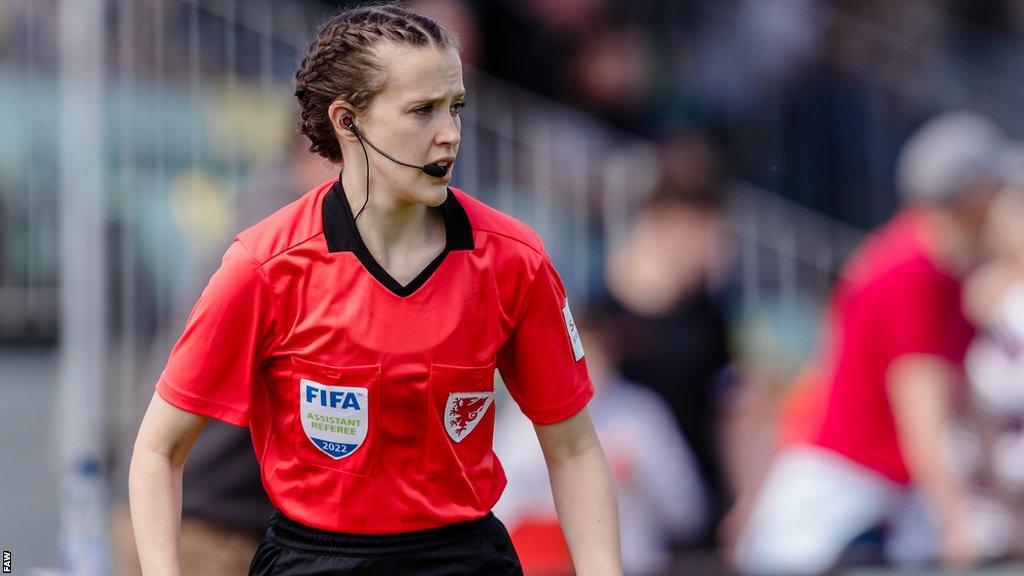A quarter of Welsh match officials physically abused, says FAW survey
- Published
Match official abuse must be 'dealt with better', says World Cup referee Cheryl Foster
A Football Association of Wales (FAW) survey has revealed that one in four match officials in Wales have suffered physical abuse while officiating.
Of the 282 respondents to the FAW survey, 88% said they had also been verbally abused.
The association says officials are walking away from football because of the "negative behaviour".
As a result, there are not enough officials to cover every grassroots game in Wales.
The FAW is taking action in response, with a sin-bin trial and a new reporting scheme to combat abuse of match officials.
Referees aged under 18 will wear yellow armbands in Wales to show they are juniors.
More than 50% of those surveyed felt the "behaviour of football participants towards referees was getting worse".
'Is it worth it really?'
Sean Regan, a sport lecturer, coach and former referee, says he is among those who have been affected.
He said: "It put me in a position that made me decide that I wouldn't continue with refereeing.
"It just made me question, 'is it worth it really?'.
"I feel like there needs to be a change in culture. We will not have football, grassroots football, or any other sport, without officials.
"We need to act and behave on the side of the pitch the way we think we should act and behave walking down the street, or in our office.
"All members of the football family are role models to our players, and we need to keep that in mind all the time."
The FAW says many match officials are "making the unfortunate decision to not continue refereeing" as a result of abuse.
In its statement, the FAW added: "Referees taking the decision to leave the game has an incredibly detrimental impact on the whole of Welsh football, as there are currently not enough active referees to provide a match official at every grassroots game in Wales."
The sin-bin trial aims to "reduce dissent towards match officials", who have been given guidance on how to report any additional misconduct.
The trial of sin-bins in six grassroots Welsh leagues was announced in May.
Drop-out rate 'significantly higher' for women
The association is also looking to fight "additional misconduct", which includes behaviour of club officials, spectators or players "before or after the match, or after having been sent off".
Ceri Williams, Welsh referee and the FAW's first women's referee development officer, said: "Refereeing in general has a really poor retention rate, which isn't something specific to Wales, it's across all the countries.
"This is due to the general abuse that you can receive as a referee. But I think the drop-out rate is significantly higher in women for that reason, that's why introducing initiatives that offer support and aid retention are so important.
"I would often receive comments such as 'go back to the kitchen' or 'go home to your husband'.
"Psychologically I think personal comments were sometimes harder to deal with as they were targeted at me due to being a woman.
"We see a lot of girls walking away from the game because of that reason and this highlights the importance of having a support network that the Adran Leagues Referee Academy (ALRA) will provide, and an opportunity to learn from those who have experienced this."

Ceri Williams was appointed as the FAW's first women’s referee development officer in 2022
Fifa funding has helped the FAW establish ALRA, which is aimed at ensuring "the rapidly growing women's game" has enough match officials.
The FAW currently has 50 registered female referees and says more than 130 women and girls having signed up to refereeing induction workshops.
FAW match officials recruitment and retention executive Jack Rea said: "The worrying survey results show the importance of the FAW and the wider football family tackling the issue of referees receiving abuse.
"Despite the abuse that many referees have received, across Wales we still thankfully have great referees that are continuing in football due to their love of the game and their key role in it.
"At the FAW and across area associations, we are currently recruiting record numbers of match officials, with an unprecedented interest in refereeing among women and girls.
"Retention of these referees is therefore key, and to achieve this we must ensure fair and respectful behaviour to strengthen the game as a whole."

ONE MAN AND HIS ISLAND: What's life like for Flat Holm Island’s newest warden?
YR WYDDFA: Life on Britain's busiest mountain
